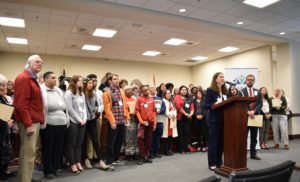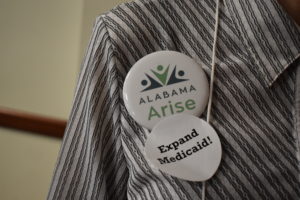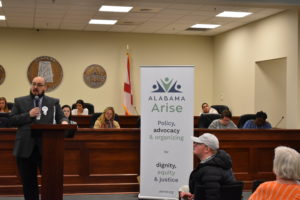Why Medicaid expansion is a must for prison reform
By Jim Carnes, policy director
Against a backdrop of human tragedy, Gov. Kay Ivey’s Study Group on Criminal Justice Policy is working toward a January deadline for its recommendations to the Legislature. The U.S. Department of Justice in April issued a sobering overview of the Alabama corrections system’s numerous shortcomings. And the Montgomery Advertiser shed further light on the situation in November, publishing horrific accounts of life inside state prisons.
It’s no secret that Alabama’s prisons are overcrowded, violent and inhumane. Any meaningful solution to this crisis must address two major challenges. First, it must alleviate the abysmal conditions inside Alabama’s prisons. Second, it must help people who are at risk of incarceration or re-incarceration become productive members of their communities. (See the key policy recommendations from Alabamians for Fair Justice below.)

The missing voices who need to be heard
Alabama Arise has been following the study group’s learning curve on a broad array of criminal justice issues. In four public meetings since July, members have received a flood of statistics from prison administrators, sentencing specialists, law enforcement officers, prosecutors, judges, mental health officials and other experts. They also have toured multiple correctional facilities, becoming eyewitnesses to the shameful conditions they’re charged with improving.
Largely missing from this crash course: the voices of the people Alabama’s criminal justice system affects most. The panel should fill that gap by inviting testimony from inmates’ family members and formerly incarcerated individuals. Many of them have attended the public study group meetings, and the formal recommendations should reflect their lived experiences.
Policy solutions should ease reentry, reduce recidivism
Of the roughly 21,000 people in Alabama’s prisons in a given year, 95% eventually reenter society, according to the Alabama Department of Corrections (DOC). Of those, about 29% wind up back in prison within three years.
Breaking the cycle of recidivism is a challenge that reaches beyond DOC, or even criminal justice policy. It also requires community partnerships to serve people with untreated mental health and addiction problems. These challenges can undermine successful reentry and often contribute to incarceration in the first place.
By targeting recidivism, the study group is highlighting our state’s overburdened community mental health and substance use services network. Medicaid expansion, at a 90% federal match, would allow Alabama to expand these services tenfold for the same state investment. The study group should urge our state to take this essential step forward.
The study group’s measured, highly visible approach to its complicated challenge is not one it can easily shrug off. The panel has set a high bar for meaningful recommendations, and Arise expects them to meet it. Arise and our partners in the Alabamians for Fair Justice alliance will keep up the pressure for comprehensive, lasting reform.
The path to a better corrections system
Alabama’s corrections system must become more humane and restorative. Alabama Arise and our allies in the Alabamians for Fair Justice coalition have proposed numerous changes to put our state on a path toward dignity, equity and justice for all. Here are a few of these recommendations:
- Expand state investments in mental health care and treatment for substance use disorders.
- Increase state support for mental health courts, pretrial diversion and reentry programs.
- Reduce court costs and give people a reasonable amount of time to begin paying fines and restitution after returning from prison.
- End automatic suspensions of driver’s licenses in cases unrelated to traffic safety.
- Apply the state’s presumptive sentencing guidelines retroactively.
Visit alabamafairjustice.org/resources to read the coalition’s full list of policy solutions on prison reform in Alabama.
Long-term care reforms already exceeding goals
By Jim Carnes, policy director
Alabamians who need long-term care services should be able to get them at home or in their communities whenever possible. And Alabama Medicaid’s new reform initiative, the Integrated Care Network (ICN), is making progress toward that goal.
The ICN has completed a successful first year of operation with strong help from consumer voices at the policy table. The network seeks to increase the share of Medicaid long-term care patients who receive services in home and community settings rather than in nursing facilities.
In Year 1, the ICN reached its five-year benchmark for this quality measure four years early, thanks to a new approach to care coordination, data analysis and consumer education. Medicaid implemented an accelerated enrollment process Oct. 1, as consumer advisers recommended. That process should further increase the share of home- and community-based participants in Year 2.
More than 15,000 of Alabama’s Medicaid long-term care patients reside in nursing facilities. Another 8,000 receive care in other settings. Because federal Medicaid rules originally targeted long-term care services to nursing home patients only, states must request “waivers” suspending those rules to deliver home- and community-based services. The ICN includes two of Alabama’s waiver programs, both managed through the state’s 13 Area Agencies on Aging.
Alabama Arise has a seat on the ICN’s governing board, along with our partners at AARP Alabama, the Alabama Disabilities Advocacy Program and Disability Rights and Resources. We’re also represented on the network’s Consumer Advisory Committee (CAC).
The CAC has a productive relationship with Alabama Select Network, the Blue Cross Blue Shield subsidiary that administers the ICN. The committee is promoting consumer choice in care settings and working to lift practical barriers to home- and community-based care.
Alabama’s higher ed funding cuts since 2008 are nation’s worst
By Chris Sanders, communications director
Shortchanging education is shortchanging our future. But since 2008, Alabama has slashed its per-student state higher education funding by 36.2%, or $4,466 per student, according to the Center on Budget and Policy Priorities. Our state’s cuts are the nation’s worst by dollar amount and third worst by percentage.
With state funding down, tuition at public four-year institutions has soared, jumping 72.9% since 2008. These increases have erected barriers to economic opportunity for people across Alabama. And the higher costs disproportionately harm black and Latino families.
Policy choices created this problem, and better ones can solve it. Click here to learn more. Then listen to Arise’s interview with WBHM on how Alabama can help make college accessible and affordable for everyone.
Explaining Alabama to out-of-town guests
By Robyn Hyden, executive director
At Arise, I’m often called upon to explain Alabama to people who aren’t from here. This is happening more frequently as people make pilgrimages to Montgomery from all over the world to visit the EJI memorial and museum. They’re curious about what people in Alabama are doing to address continuing inequities.
Sometimes, these visitors get bogged down in the weeds of our politics and policies, overwhelmed by the barriers Alabamians face every day. More frequently, they reflect amazement. The story we tell is one of sustained work, power building and organizing. The message we share: Only by joining and working together can we ever prevail in the long fight for justice. Our plea is for more people to invest in our work for change.
This is what I leave them with: I’m grateful that more people are speaking out and joining us. I’m encouraged by all we have accomplished together. We can’t do it alone – and that’s why I’m especially grateful for Arise supporters like you.
We’re lifting community voices in Alabama Medicaid
By Presdelane Harris, organizing director
Alabama Medicaid is at a moment of transformation, opening up opportunities for a new focus on improving health outcomes. And Alabama Arise is working hard to ensure community needs and voices stay at the forefront.
Medicaid primary care is moving from a statewide fee-for-service model to a system of seven Alabama Coordinated Health Networks (ACHNs). The regional, nonprofit ACHNs began offering services Nov. 1, focusing on prevention, care coordination and health improvements. The inclusion of consumer representatives on regional governing boards and advisory committees allows an unprecedented opportunity for Medicaid consumers to provide input directly to program officials.
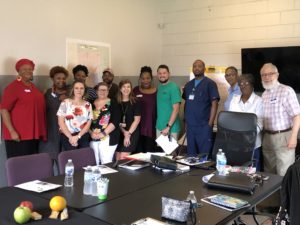
In a pilot program designed to take advantage of these reforms, Arise has partnered with the Bay Area Women Coalition to enhance the local health system’s ability to promote greater food security in the Trinity Gardens neighborhood of Mobile. We’ve reached more than 100 people over six community meetings this year.
The community engagement effort is producing results. We’ve identified potential leaders and worked with residents to prioritize their ideas. We’re also discussing ways to strengthen community input as Medicaid implements and evaluates quality improvement projects.
Arise is grateful for our partnership with our Trinity Gardens neighbors. And we hope to build similar connections in communities across Alabama.
Spread the word about Arise this holiday season!
By Brenda Boman, development director
You may have a list of topics that you consider taboo at holiday gatherings. But I hope that finding ways to help Alabamians living in poverty isn’t on that list. When you’re among friends and family who believe life should be better for struggling Alabamians, I hope you’ll make sure they know about Alabama Arise.
Arise’s membership has grown exponentially in recent years, and we hope to continue that trend. As an inclusive organization, we welcome everyone who wants to advocate for a brighter future for Alabama.
We need to bring together people who support Medicaid expansion, payday lending reform and voting rights. We need to bring together people who want to fund public transportation and untax groceries. And we need to bring together people who are determined to break down policy barriers to shared prosperity across our state.
We need your help to do it. Please don’t shy away from helping Arise achieve our vision of a better Alabama for all! Encourage your friends to become Arise members by making a donation in any amount here.
Gift memberships are another way to introduce friends to Arise. Email us at info@alarise.org with the names and complete contact info for those you’re sponsoring.
Welcome to Arise, Celida!
Please help us welcome Arise’s new hunger advocacy coordinator, Celida Soto Garcia! She will work to strengthen child nutrition, identify and train advocates, and expand our coalition to reduce hunger across Alabama.

Celida is a Birmingham resident and graduated from Rutgers University with a dual degree in administration of justice and sociology. She grew up as a Jersey girl speaking Spanish first, and she has participated in movements related to economic injustice, women’s rights, food sovereignty, public safety and criminal justice reform. Most recently, she served as an educational liaison with the UAB Minority Health and Health Disparities Research Center. When you see Celida, be sure to say hello!



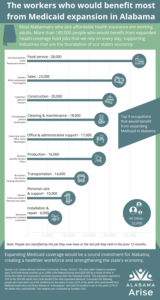

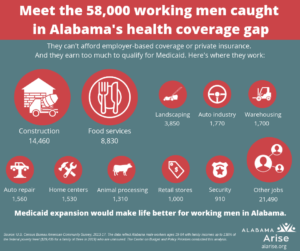



 LIHCA thanks Alabama Arise and its members for supporting the Housing Trust Fund in 2018 and previous years. Our combined efforts resulted in social and political momentum to secure dedicated revenue for the Alabama Housing Trust Fund (AHTF)! We are here to ask for your continued support of the AHTF and help in securing dedicated revenue for the fund in 2020.
LIHCA thanks Alabama Arise and its members for supporting the Housing Trust Fund in 2018 and previous years. Our combined efforts resulted in social and political momentum to secure dedicated revenue for the Alabama Housing Trust Fund (AHTF)! We are here to ask for your continued support of the AHTF and help in securing dedicated revenue for the fund in 2020. Let’s build on Arise’s commitment to voting rights, continuing to prioritize automatic voter registration (AVR) and focusing on restoration of voting rights for Alabamians affected by felony disenfranchisement. Under AVR, Alabamians would be registered to vote by default, without having to register themselves, because the state already has the necessary information. And restoring voting rights for everyone would affirm basic ideals of democracy.
Let’s build on Arise’s commitment to voting rights, continuing to prioritize automatic voter registration (AVR) and focusing on restoration of voting rights for Alabamians affected by felony disenfranchisement. Under AVR, Alabamians would be registered to vote by default, without having to register themselves, because the state already has the necessary information. And restoring voting rights for everyone would affirm basic ideals of democracy. Court fees and fines impose heavy burdens on many struggling families. Driver’s license suspensions over unpaid fines can cause Alabamians with low incomes to lose their jobs. Cash bail for minor offenses can imperil families’ economic security. And multiple fees can stack up, making it impossible to move on from a conviction because consequences never end. In Alabama, people are subject to 63 separate fees in the criminal justice system – including even a $1 fee for paying fee installments.
Court fees and fines impose heavy burdens on many struggling families. Driver’s license suspensions over unpaid fines can cause Alabamians with low incomes to lose their jobs. Cash bail for minor offenses can imperil families’ economic security. And multiple fees can stack up, making it impossible to move on from a conviction because consequences never end. In Alabama, people are subject to 63 separate fees in the criminal justice system – including even a $1 fee for paying fee installments. Alabama’s capital punishment system is unreliable and racist. Our state hands down nearly double the national average of death sentences. We are the only state with no state-funded program providing legal aid to death row prisoners. And state laws give insufficient protection against executing people who were mentally incapable of understanding their actions.
Alabama’s capital punishment system is unreliable and racist. Our state hands down nearly double the national average of death sentences. We are the only state with no state-funded program providing legal aid to death row prisoners. And state laws give insufficient protection against executing people who were mentally incapable of understanding their actions. Every year, high-interest loans trap thousands of struggling Alabamians in a cycle of deep debt. Payday loans are short-term (usually two-week) loans charging high annual percentage rates (APRs), up to 456%. Auto title loans charge up to 300% APR and also carry the risk of repossession of the family vehicle.
Every year, high-interest loans trap thousands of struggling Alabamians in a cycle of deep debt. Payday loans are short-term (usually two-week) loans charging high annual percentage rates (APRs), up to 456%. Auto title loans charge up to 300% APR and also carry the risk of repossession of the family vehicle. Our state’s jumble of local transportation systems fails to meet the needs of many people in rural, suburban and urban areas. Alabama is one of just five states with no state public transportation funding. For many low-income workers, seniors and people with disabilities, the transit gap is a barrier to daily living. Many folks can’t get to work, school, the doctor’s office or other places they need to go in a reasonable amount of time.
Our state’s jumble of local transportation systems fails to meet the needs of many people in rural, suburban and urban areas. Alabama is one of just five states with no state public transportation funding. For many low-income workers, seniors and people with disabilities, the transit gap is a barrier to daily living. Many folks can’t get to work, school, the doctor’s office or other places they need to go in a reasonable amount of time. Our state’s upside-down tax system starves state budgets of money needed to invest in our shared future. Alabama provides almost no state money for child care. In-home services for parents of at-risk children receive a paltry $3 million a year, far less than other states. And young adults struggle to afford rising tuition and fees at universities and two-year colleges.
Our state’s upside-down tax system starves state budgets of money needed to invest in our shared future. Alabama provides almost no state money for child care. In-home services for parents of at-risk children receive a paltry $3 million a year, far less than other states. And young adults struggle to afford rising tuition and fees at universities and two-year colleges. Alabama’s tax system is upside down. The rich get huge tax breaks, while the heaviest tax burden falls on people with low and moderate incomes. High, regressive sales taxes on groceries and other necessities drive this imbalance. So does the state’s deduction for federal income taxes (FIT), a skewed break that overwhelmingly benefits wealthy people.
Alabama’s tax system is upside down. The rich get huge tax breaks, while the heaviest tax burden falls on people with low and moderate incomes. High, regressive sales taxes on groceries and other necessities drive this imbalance. So does the state’s deduction for federal income taxes (FIT), a skewed break that overwhelmingly benefits wealthy people.
